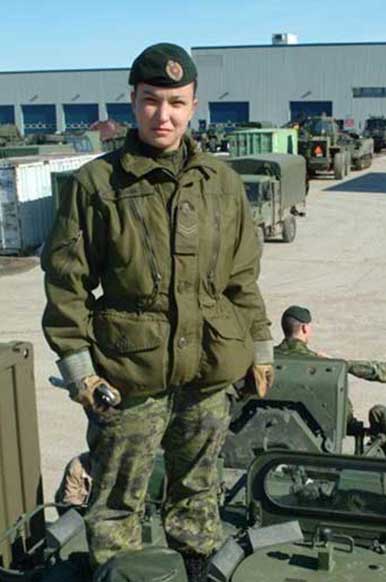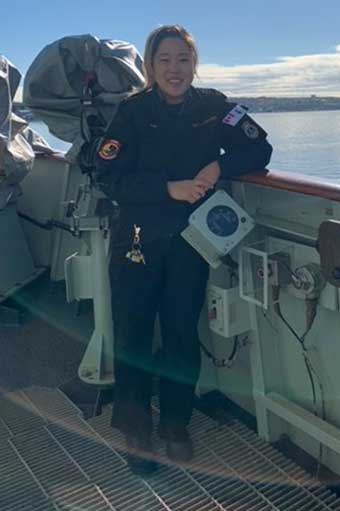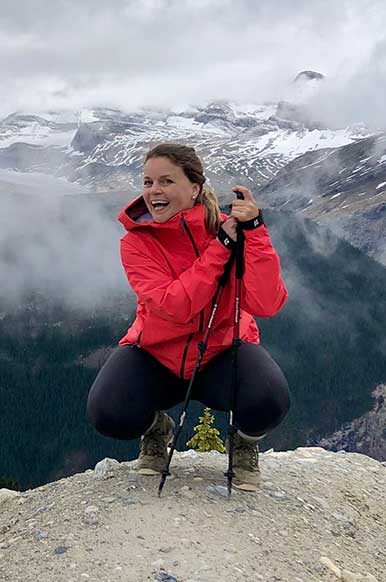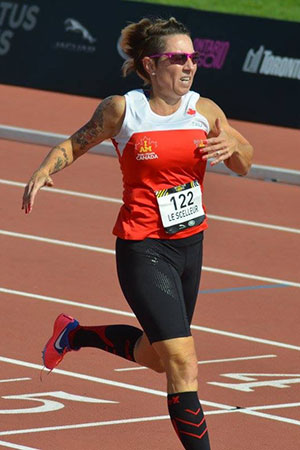
Joined
1973
Postings
- Royal Montreal Regiment
Deployments
- 2003: Operation CROCODILE
- 2005, 2011: Afghanistan
Hamel was named after his uncle Charlie, who lost his leg while serving in the Second World War. His father was an infantry officer with the Royal 22e Régiment and had served in the Korean War, while another of his uncles served in the Second World War, piloting landing craft.
It just seemed like that's where I needed to be.
After completing Basic Officer Training, Hamel served with the Royal Montreal Regiment, a Reserve unit that he would later command in 1986. “We have a strong family lineage in the military,” he says. “It just seemed like that’s where I needed to be.”
His first deployment came in 2003, as part of Operation Crocodile, on a United Nations (UN) peacekeeping mission to the Democratic Republic of the Congo. Hamel knew plenty about the country and previous UN efforts there. His father had served on a UN peacekeeping mission to the Congo in the early 1960s, shortly after the country declared independence from Belgium.
“I did know vaguely of what my father had done when he was there, so I did have some background and some history,” he says “Who wouldn’t want to serve on the same mission that their father had served on, 42 years later?”
In addition to his father, Hamel’s former neighbour, Colonel Tony Poulin, had also served with the United Nations in the Democratic Republic of the Congo, in 1961-62. Hamel dedicated his work in the Democratic Republic of the Congo, to both his father and Colonel Tony Poulin.

Colonel Tony Poulin, served with ONUC in 1961-62, in the Democratic Republic of the Congo
As part of Operation Crocodile, Hamel arrived in the Congo in July 2003 as the head of a small Canadian detachment. He went on to serve as the chief of staff of a multinational headquarters with over 200 officers, that represented 30 countries participating in the peacekeeping mission. Upon arriving, he recalls surveying the ravaged country.
I had witnessed a lot of places in the world that were impoverished, but nothing really to the scale that it was there.
“The heat just really hits you, and the humidity, because the country actually straddles the equator. Dirty pollution, the smell, the poverty. It was just a totally different environment. I had witnessed a lot of places in the world that were impoverished, but nothing really to the scale that it was there.”
While he was there, the level of violence increased in the Eastern part of the country. Hamel was deployed out of the country’s capital to the Ituri Brigade, the UN force stationed in the region.
“Right from the get go it was very chaotic,” Hamel says. “The very first evening, when I arrived, and was in a relatively safe house, it was being attacked.”
As part of his duties, Hamel helped prepare for the arrival of more peacekeepers from other United Nations countries. They were to deploy to the Eastern part of the Congo to replace a French battle group that had been serving in the region. Hamel worked to create the command structure and organization of the pending multinational brigade.

Occasionally, while on patrol, members of armed groups in the country would surrender, and voluntarily disarm, to United Nations forces. Pictured is Colonel Hamel, and members of a group of 75 Mayi-Mayi (Mai-Mai) who voluntarily surrendered to MONUC.
He also toured the eastern provinces and gathered intelligence on military activity in the region, including the use of child soldiers, which was very prominent in the country at that time.
Hamel also recorded his experiences in the country, emailing to his friends, family and co-workers back in Canada a photo every couple of days, along with an explanatory description.
“I sent probably every second day or so a picture, and an article as to what the picture depicted and what's going on in the Congo,” he says.
After Operation Crocodile, Hamel served on two tours in Afghanistan, one in 2005 and one that ended in 2011.
Hamel retired in 2015, after 42 years of service. Outside of his service in the CAF, he has been awarded the Minister of Veterans Affairs Commendation for his volunteer work serving Veterans. Since 1997, he has been an advocate and volunteer with the Calgary Military Families Resource Centre (MRFC), as a leading figure in their annual fundraising efforts.
With courage, integrity and loyalty, Charles Hamel has left his mark. He is one of our Canadian Veterans. Discover more stories.
You can also listen to his podcast episode.















